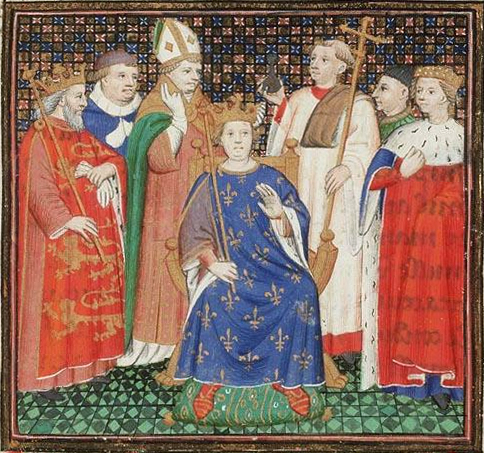The Cutting of the Elm at Gisors

We love buying timber in France. On our most recent trip we bought a log of French elm, a new product for us, but a beautiful thing that we just couldn’t resist.
It got us thinking about history, something that you really feel when dealing with French mills. Many businesses aspire to have an air of timelessness. It is often imitated and seldom replicated, but it is something French mills have in spades.
English history is often incredibly bound up with France. We are held fast to one another, caught in a tangled net woven of our shared language, culture and sensibilities.
We were even closer once though…
For a long time the border between territories belonging to the Kings of France and England stretched from the English Channel to the Pyrenees, bifurcating the country as we know it today and rendering cities like Paris uncomfortably close to a shaky border. This boundary was frequently the site of vicious armed conflict, one of which was caused by someone cutting down an elm tree much like ours.
We’re hoping there won’t be a repeat…
A Game of Thrones
That long border was the result of a big dynastic change in England. The last surviving son of William the Conqueror had died without producing a (legitimate!) male heir. Matilda, his daughter and the duchess Anjou in southern France, was the only suitable heir. As William had been the duke of Normandy, this meant that two of the largest territories in France were the hereditary possessions of the English king.
The king of France had little effective control over more than half of what was notionally HIS kingdom. Henry II, the first of the Plantagenet kings and a bit of a wind up merchant, took full advantage of the odd situation by generally making a nuisance of himself to the French (read sacking their castles, raiding their cities and – most egregiously – nicking the French king’s wife). All this laddish banter kicked off a period of armed struggle now known as the Angevin-Capetian Conflict
The Lion-Heart, the Wych-Elm and the WAR-drobe…
Henry soon passed the baton of annoying the French to his son Richard, The Lionheart, who dedicated himself to the family pastime with gusto. At this point in history war was literally up-close-and-personal, with the petty insults traded between combatants determining the order of battle as much as any grand strategy. The English had been raiding close to Gisors, on the border of France-proper and Normandy, Richard’s dukedom. Knights loyal to the king of France had sworn to put an end to the English menace in the region, but until that point had had limited success. Richard, true to form, sent a letter to the French teasing them for their incompetence and daring them to meet him beneath The Elm at Gisors – an ancient and huge tree that marked the boundary of the Norman duchy.
This was the medieval equivalent of offering someone a fight behind the bike sheds after school.
It worked though. The French responded that not only would they come, but they would cut the tree down to spite Richard. Not one to be outdone in games of diplomatic childishness, Richard had his men fasten huge iron bands around the tree. No problem, said the French, we’ll just pull them off and cut it down anyway. “Bring it,” said Richard*.
The Battle at Gisors
The French came in force. Five full squadrons of men-at-arms and over a hundred knights escorted a force of engineers and woodsmen. The English came in force themselves, with an army more than equal to the French – a force which included Richard himself who personally fought dozens of knights in hand-to-hand combat, including a now famous duel with Guillame of Barre.
The king of England risked his life to save a tree.
Both armies only retreated when night fell. The next day a simultaneous invasion of England by the Scots, Welsh and Irish called Richard away. He would otherwise have been willing to continue the battle.
Our Elm Log
Sadly the French succeeded in cutting the Elm down, so we cannot say for certain what it looked like. Our beautiful log certainly has enough character to capture the heart of the noblest lord or lady. Maybe not quite enough to justify going to war for!
So saddle your steed, strap on your sword belt and summon your faithful squire – we ride to Thorogoods!
*Richard’s reply is not actually recorded, but it was definitely either “bring it”, or words to that effect
Blog | 6 years AGO